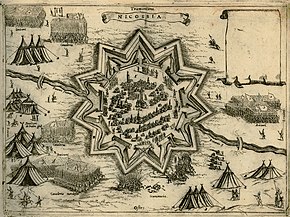Massacre in Nicosia

The Massacre in Nicosia was a massacre committed by the Ottomans during Ottoman–Venetian War (1570–1573).
On 3 July 1570, Cyprus was invaded by troops of the Ottoman Empire. On 22 July Piali Pasha, having captured Paphos, Limassol and Larnaca, marched his army towards Nicosia and laid siege to the city.[1] The city managed to last 40 days under siege until its fall on 9 September 1570.
Approximately 20,000 Greek inhabitants died during and following the siege and every church, public building, and palace was looted.[2] Nicosia had an estimated population of 21,100 before the Ottoman invasion and, based on the Ottoman census data of 1572, the population was reduced to 1,100–1,200.[3] The devastation of the city was so extensive that, for several years after the conquest, a number of Cypriot villages had a larger population than the city.[4] The main churches, including Saint Sophia Cathedral, were converted into mosques.[5]
Arnaude de Rocas is a legendary personality from Cyprus, remembered there as a martyr[6] and a Cypriot heroine.[7]
References
- ^ "Cyprus – Historical Setting – Ottoman Rule".
- ^ Hopkins, T.C.F. (2007). Confrontation at Lepanto: Christendom vs. Islam. Macmillan. p. 82.
- ^ Theocharides, Ioannis (2012). "Nicosia Under Ottoman Rule 1570–1878: Part I". Rimal Books. p. 237.
- ^ "Nicosia Municipality". Archived from the original on 7 March 2012.
- ^ Jennings, Ronald C. (1993). . New York, London. Christians and Muslims in Ottoman Cyprus and the Mediterranean World, 1571–1640. New York University Press. p. 256.
{{cite book}}: CS1 maint: multiple names: authors list (link) CS1 maint: numeric names: authors list (link) - ^ Journal des demoiselles (in French). Bureau du journal. 1838.
- ^ Celebrating the 1821 Bicentennial, pahellenicfoundation.org
